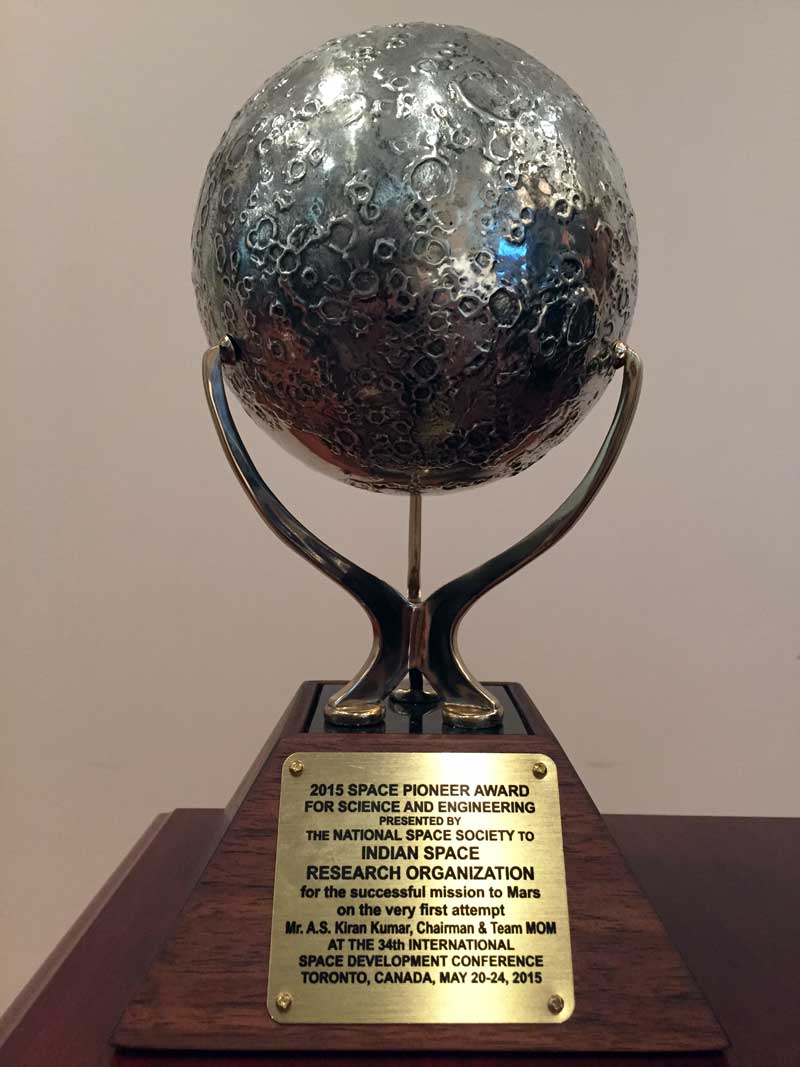The U.S. National Space Society (NSS) presented the Space Pioneer award for 2015 to Indian Space Research Organisation (ISRO) in recognition of the latter’s efforts in accomplishing the low-cost Mars mission in its very first attempt. ISRO received the award in the Science and Engineering category during the 34th Annual International Space Development Conference held at Toronto in Canada during May 20 -24, 2015.

The Indian Mars mission success in the very first attempt is an historical feat by any space faring individual nation. The Mars Orbiter Mission (MOM) team built the spacecraft with five scientific payloads in a record time of eighteen months and launched it on 5th November, 2013. The spacecraft and the payloads have performed as desired during their 300 days run, travelling about 666 million kilometer interplanetary space before entering the Red Planet’s orbit on September 24, 2014. The spacecraft is in an elliptical orbit, while a high-res camera onboard MOM captures full-disk color imagery of Mars at apoareion and close-ups at periareion. MOM has outlived the ‘Prime’ mission life of six months, and continues to deliver scientifically significant datasets. The team at ISRO behind MOM has dexterously handled the scientific, technical, managerial and financial aspects of the mission.
In 2009, National Space Society (NSS) had presented this award to ISRO for the latter’s accomplishment of Lumar Probe, Chandrayaan-1. The Space Pioneer Award comprises a silvery pewter Moon globe cast by the Baker Art Foundry in Placerville, California, from a sculpture originally created by Don Davis, the well-known space and astronomical artist.
via : ISRO
The U.S. National Space Society (NSS) presented the Space Pioneer award for 2015 to Indian Space Research Organisation (ISRO) in recognition of the latter’s efforts in accomplishing the low-cost Mars mission in its very first attempt. ISRO received the award in the Science and Engineering category during the 34th Annual International Space Development Conference held at Toronto in Canada during May 20 -24, 2015.
The Indian Mars mission success in the very first attempt is an historical feat by any space faring individual nation. The Mars Orbiter Mission (MOM) team built the spacecraft with five scientific payloads in a record time of eighteen months and launched it on 5th November, 2013. The spacecraft and the payloads have performed as desired during their 300 days run, travelling about 666 million kilometer interplanetary space before entering the Red Planet’s orbit on September 24, 2014. The spacecraft is in an elliptical orbit, while a high-res camera onboard MOM captures full-disk color imagery of Mars at apoareion and close-ups at periareion. MOM has outlived the ‘Prime’ mission life of six months, and continues to deliver scientifically significant datasets. The team at ISRO behind MOM has dexterously handled the scientific, technical, managerial and financial aspects of the mission.
In 2009, National Space Society (NSS) had presented this award to ISRO for the latter’s accomplishment of Lumar Probe, Chandrayaan-1. The Space Pioneer Award comprises a silvery pewter Moon globe cast by the Baker Art Foundry in Placerville, California, from a sculpture originally created by Don Davis, the well-known space and astronomical artist.
via : ISRO